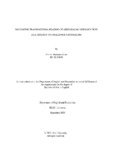| dc.contributor.advisor | Noman, Abu Sayeed Mohammad | |
| dc.contributor.author | Alam, Umma Maimuna | |
| dc.date.accessioned | 2024-04-22T06:13:04Z | |
| dc.date.available | 2024-04-22T06:13:04Z | |
| dc.date.copyright | 2023 | |
| dc.date.issued | 2023-09 | |
| dc.identifier.other | ID 20103049 | |
| dc.identifier.uri | http://hdl.handle.net/10361/22645 | |
| dc.description | This thesis is submitted in partial fulfillment of the requirements for the degree of Bachelor of Arts in English, 2023. | en_US |
| dc.description | Cataloged from PDF version of thesis. | |
| dc.description | Includes bibliographical references (pages 59-64). | |
| dc.description.abstract | "Transnationalism can be defined as an outcome of diverse dispositions and multiple belongings emerging together without reducing either the social context nor the national distinction. This paper examines how transnationalism provides altered space to the stories of displaced people or migrants beyond embedding their stories with nationalism. Gurnah is known as an ‘immigrant writer’, and his works shed light to the different perspectives of displaced people. This paper exemplarily analyzes the narratives of Abdulrazak Gurnah’s characters in Paradise and argues that Gurnah successfully incorporated ambivalent experiences, displacement realities and hybrid identity strategically to contribute within the transnational narratives. Transnationalism provides extended attempts to depict the stories of migrants or displaced people. With the development of nation state and national identity, within the postcolonial contexts, nationalism plays a vital role while representing individuals or communities' identity and sense of belonging. Using postcolonial theory, this paper also focuses on investigating how Gurnah’s novel contributes to transnational studies by not limiting character’s categorization and dependence on nationalism for identification. Within the postcolonial readings, the narratives of displaced migrants are often seen through the lens of conventional migration theory as it limits the social context and sentimental effects of migration within nationalism confining the understanding of the migrated individuals’ narratives. This paper attempts to contribute to extending Gurnah’s work within transnational studies.
" | en_US |
| dc.description.statementofresponsibility | Umma Maimuna Alam | |
| dc.format.extent | 64 pages | |
| dc.language.iso | en | en_US |
| dc.publisher | Brac University | en_US |
| dc.rights | Brac University theses are protected by copyright. They may be viewed from this source for any purpose, but reproduction or distribution in any format is prohibited without written permission. | |
| dc.subject | Nationalism | en_US |
| dc.subject | Transnationalism | en_US |
| dc.subject | Hybridity | en_US |
| dc.subject | Belonging | en_US |
| dc.subject | Intertextuality | en_US |
| dc.subject | Ambivalence | en_US |
| dc.subject | Postcolonialism | en_US |
| dc.subject | Gurnah | en_US |
| dc.subject.lcsh | Nationalism | |
| dc.title | Navigating transnational reading of Abdulrazak Gurnah's text as a getaway to challenge nationalism | en_US |
| dc.type | Thesis | en_US |
| dc.contributor.department | Department of English and Humanities, Brac University | |
| dc.description.degree | B.A. in English | |

